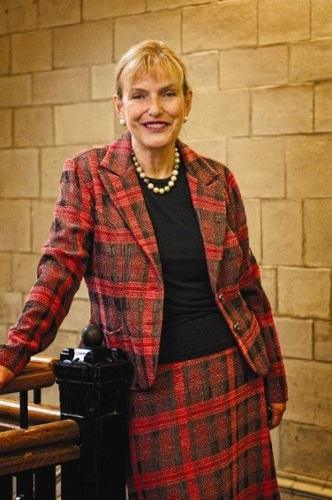
New department head remains research-focused
The new head of the Department of Microbiology and Immunology is looking forward to her new role as the basic science departments start their transition
By Marg SheridanOn July 1, as Canada celebrated its’ 149th birthday, Dr. Jo-Anne Dillon officially started her new role as the head of the Department of Microbiology and Immunology.
It’s a role that’s going to take play an important role as the basic science departments enter a period of transition.
“The basic science departments are transitioning to a new governance model; the faculty voted for a merger between the Departments of Biochemistry and Microbiology and Immunology,” Dillon explained. “I anticipate that during the next year I’ll be working with colleagues in both departments and in the College to co-develop a governance, educational and research mode which enhances the academic possibilities for faculty, staff and students.”
It’s a change that isn’t new to Dillon who, while working at the University of Ottawa, was witness to a similar transition.
“In Ottawa there was a similar reconfiguration of the basic science departments in the Faculty of Medicine several years ago,” she continued. “It won’t be exactly similar, of course - the cultures of the two universities and their departments are very different. I’m looking forward to the conversation with colleagues and others as a very strong, dynamic new department for education, research, and outreach is created.”
An Ottawa native, Dillon received her BSc from the University of Toronto and both an MSc and PhD in Microbiology and Immunology from Queen’s University. She’s held positions in Health Canada where she founded and directed the National Laboratory for Sexually Transmitted Infections. After moving to the University of Ottawa as the Department of Microbiology and Immunology Chair she became the inaugural Director of the Centre for Research in Biopharmaceuticals and Biotechnology. She was also the co-chair for the first two years of the medical undergraduate program. Dillon moved to Saskatoon in 2004 following her appointment as Dean of the College of Arts and Science.
Throughout her career, Dillon has always been academically affiliated with a college of medicine, and has also worked with a number of international health organizations, including the World Health Organization (WHO), and leads a laboratory network for the WHO in Latin America and the Caribbean on sexually transmissible infections. Her research focusses on sexually transmitted infections including their antimicrobial resistance, molecular epidemiology and the development of novel diagnostic approaches.
“The pathogen causing gonorrhea infections is a superbug – resistant to every class of antimicrobial agent,” she explained. “We will soon reach a point where there may not be antimicrobials to treat this prevalent disease, creating a major public health challenge which will have a disproportionate impact on maternal and child health due to complications of untreatable infections.”
Dillon, who also researches mechanisms of cell division in bacteria, does not anticipate that her research will be impacted by her new position. She maintains an active research group at the Vaccine and Infectious Disease Organization (VIDO), and believes that serving as head of the department is a way to both give contribute to the CoM, and to serve the research and educational needs of the faculty, students and staff.
“Academic service is very important,” Dillon stressed. “It’s critical to have a strong academic background in research and teaching, and to serve one’s colleagues periodically through administrative positions - I view that as very collegial and this type of service and collegiality is a strong characteristic here at the University of Saskatchewan.”
